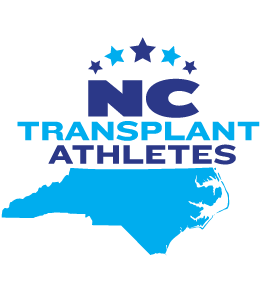The Transplant Games of America is a 5-day celebration of life and triumph after organ transplantation held every two years.
It’s a once-in-a-lifetime opportunity for everyone touched by transplant.
Most who go fall in love and are excited to return to their TGA “family” year after year.
Who goes to the Transplant Games?
The Transplant Games of America (TGA) is a five-day gathering of organ transplant recipients, living donors, deceased and living donor family members, caregivers, friends and family, members of the medical community and more — anyone with a connection to, who supports, or who has been touched by organ transplantation. Most participants come with one of the 45 or so teams, like Team NC!
Transplant Games Magic
Transplant recipients mingle
with members of donor families and able to share:
a chronic health struggle
with a surprise happy ending,
or a story of sadness
ending in a selfless gesture;
a beautifully complex perspective emerges,
adding a richness of understanding
to their own story.
TGA has three divisions for competition
DIVISION 1
for solid organ recipients, like heart, lung, liver, kidney, pancreas, intestine
DIVISION 2
for living donors, cornea, tissue and bone marrow recipients
DIVISION 3
for donor families and living donor families
(Donor families and Living Donor Families will be able to compete just as Division 1 & 2. They will compete and medal separately. Competition events will be limited to: 5K Run/Walk, Ballroom Dancing, Lyrics for Life, and Trivia)
What can I compete in?
Qualifying athletes may choose five of the following individual sports:
The level of seriousness at the Games varies by sport, but the general spirit is that everyone is there to compete and have fun, not necessarily to win!
How do I win a medal?
Athletes compete within their divisions and then by both age and sex. Learn more about the rules.
What else is there to do?
How much does it cost, and can Team NC help?
AWARENESS
To increase awareness of the life-restoring importance of organ, cornea, bone marrow, and tissue donation through the lives of the athlete-recipients and the lasting legacy of their donors.
COMMUNITY
To involve the entire transplant community — recipients, living donors, donor families, medical professionals, caregivers, transplant centers, etc. — in a shared mission to highlight the benefits of donation.
DONATIONS
To increase the number of potential donors on the National Donate Life Registry by supporting existing campaigns, putting on the Transplant Games, and with other partnerships.
AMBITION
To help carry out the Transplant Game’s mission, Team NC has liaisons dedicated to organ and tissue donor registration, minority donor outreach and awareness, and cornea and tissue donation.
